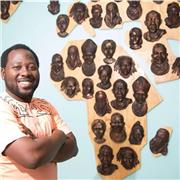Learn more about private tuition in painting
What you can learn in a painting class
Before studying art, many people take painting classes to improve their artistic skills. This includes mothers and fathers looking for an art tutor for their child, or even teenagers when they notice that their notebooks are full of drawings.
And, of course, also among adults and older people who pursue painting as a hobby and use it as a technique to relax and socialise. Painting exercises both professional and personal development. Although painting classes may be considered generic, there are many courses for different techniques:
- Painting class for beginners. Designed to teach the fundamentals of painting and drawing, such as lines, shadows and perspective. In addition to learning how to paint in oils, techniques such as painting with pencil, crayon and fine tip pen are also taught. The basic painting class could be a prerequisite for starting a Fine Art course, for example, and so we start with the previous knowledge learned from your painting tutor.
- Oil painting class for beginners. To learn oil painting from scratch, it is ideal to have a private tutor. The classes include technique and practice, the study of materials and the behaviour of light in paint and shadow. You will also learn painting techniques, how to mix colours and how to start creating oil paintings.
- Intermediate level oil painting class. Those who already have a certain mastery of the material and technique can take an intermediate oil painting class. They are based on advancing your knowledge of glass painting and learning wet-on-wet painting. Your private painting tutor will most likely ask you to follow the same style to create a portfolio at the end of the course.
- Colour theory class. Regardless of the material you choose to paint with - acrylic and oil paints, watercolours, pastels, coloured pencils, etc. - the first step in learning to paint is to understand colour theory. Concepts such as colour psychology, light and colour pigment and learning colour scales will be taught by your painting tutor. Your perception of art will change after understanding colour theory.
- Landscape painting class. If you like to paint outdoors and capture everyday situations or places on paper, a landscape painting tutor will be a great option for you. Usually this class takes place in a location where you can paint the landscape you see, or even draw it from a photograph, for example. The most common paintings are streets and buildings, mountains, rivers and beaches.
- Body drawing class. Ideal for those who want to paint realistically or are perfectionists in their attention to detail. In this painting class you will learn how to represent bodies accurately, usually with live models and even with nude models. Your drawing tutor will tell you, but the most commonly used technique for painting bodies is oil painting.
Explore online painting tuition
Online tuition can be done by video call, all you need is a computer or phone with a camera and microphone. So that your painting tutor can see you while you paint, position yourself so that the movement of your brush on the canvas or paper is also visible.
In addition, learning to paint online also allows you to use resources such as educational videos and lets you search for inspiration on the Internet. Nowadays, many painters display their portfolios to help you follow a style, or even get in touch for private tuition in painting.
As in the face-to-face classes, you will learn how to paint portraits of people, landscapes, abstract painting with different materials. The wide variety of styles includes the use of watercolour, gouache painting, acrylic painting lesson, oil painting and more. Learn the benefits of learning to paint online:
- Take painting lessons from wherever you are. That's right, there's no need to go from one place to another with your painting materials, you can take online classes from your studio or the comfort of your own home.
- Find painting tutors from all over the country. Ideal for those who live in small towns or are looking for specific professionals. The advantage is that you can do your private painting lessons online with tutors from all over UK, which increases your chances of finding a tutor you really identify with.
- Be specific about the technique you want to learn. On the Internet, you can search for tutors who give painting lessons in the technique you want to improve and also in the style that most closely resembles your own.
- Find a timetable that suits your routine. It will be even easier to find a tutor with the same time availability as yours. Your online tuition can take place at times that would not be possible in person, for example late at night or early in the morning.
Get the best prices for painting lessons. This is because your tutor then saves you the time and money on transport, and the lessons are usually more affordable. Remember that it all depends on the level of painting you want to achieve and the tutor you choose.

















